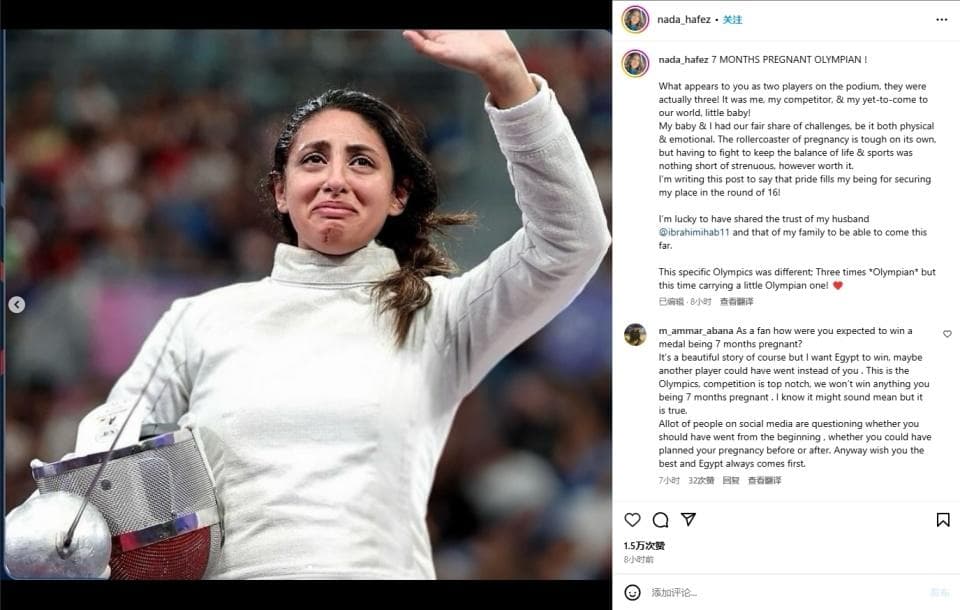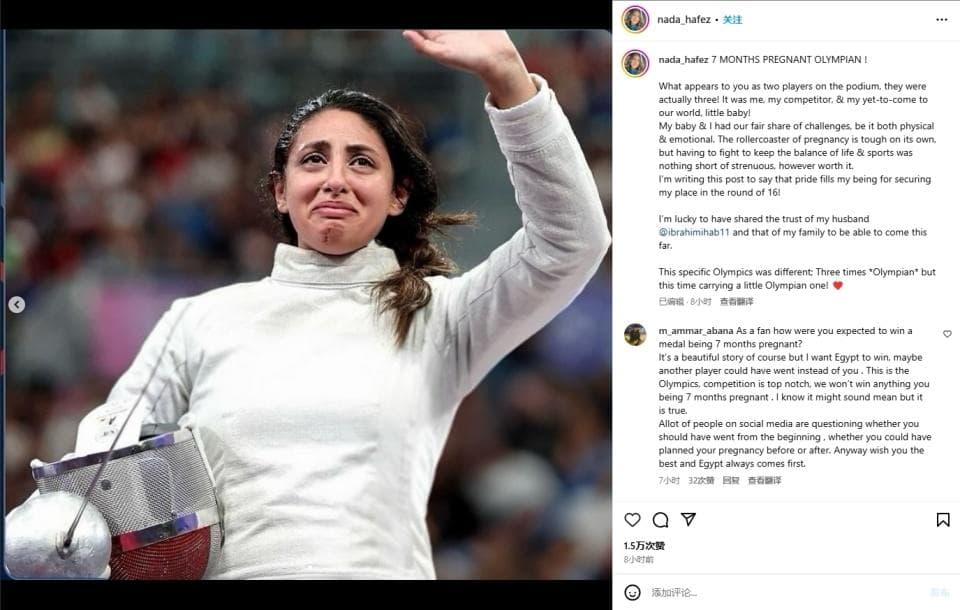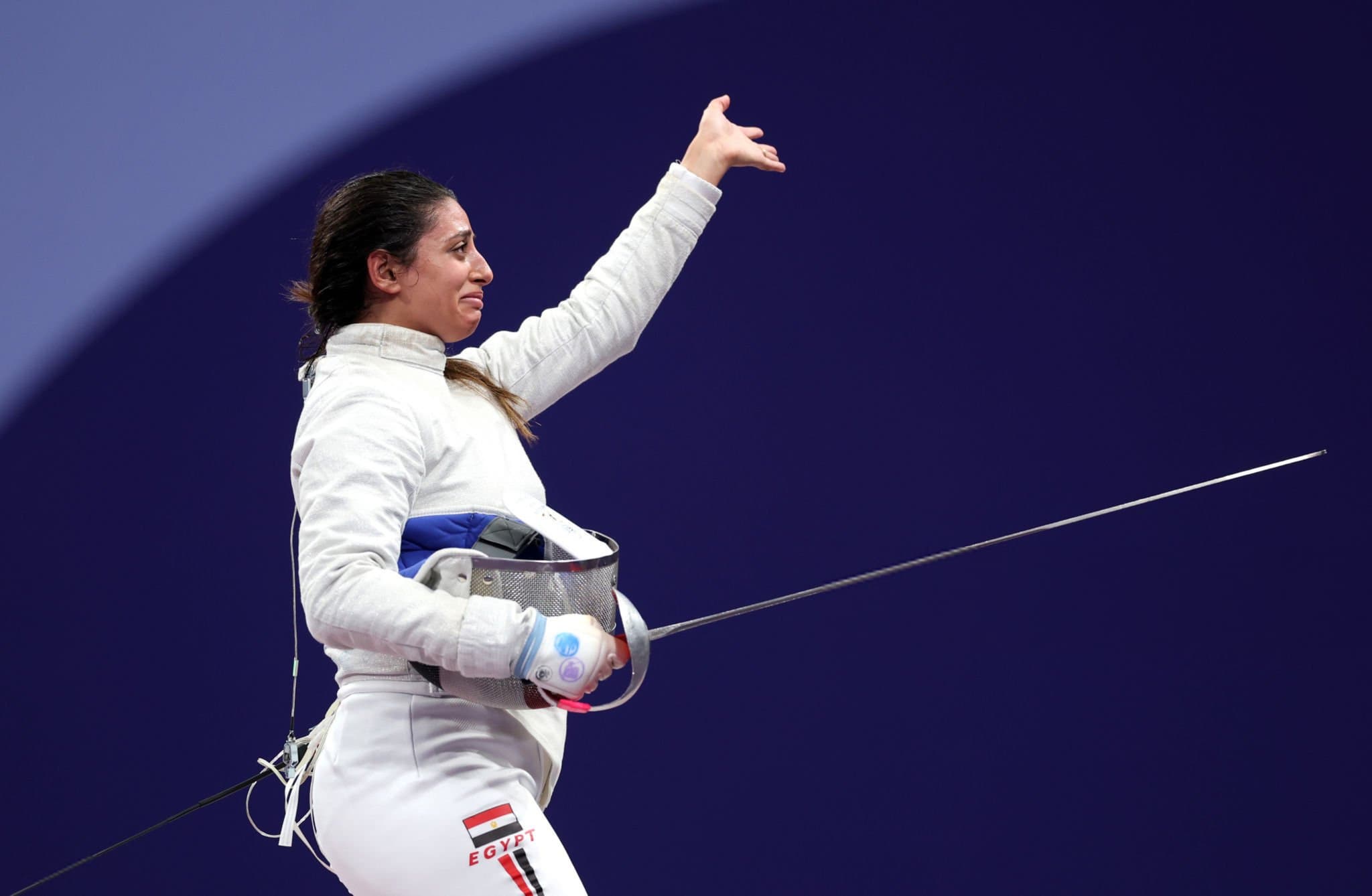7 Months Pregnant and Fencing for Glory: Olympian Nada Hafez Sparks Debate
Egyptian Fencer Nada Hafez Makes History as 7-Month Pregnant Olympian, Sparks Debate on Social Media

30 July 2024
In a remarkable display of dedication and perseverance, 26-year-old Egyptian fencer Nada Hafez competed in the women's individual sabre event at the Paris Olympics, despite being seven months pregnant. Hafez's revelation on social media has sparked both admiration and controversy, with many questioning whether she should have participated in the high-level competition at such an advanced stage of pregnancy.
According to Hafez, she decided to publicly disclose her pregnancy to showcase the resilience of Egyptian women. "Being pregnant itself is tough, and the struggle to balance life and sports was even harder, but it was all worth it," she wrote on her social media account. "I'm proud to have made it to the round of 16!"

Hafez's decision to compete while pregnant has drawn comparisons to other athletes who have achieved success in similar circumstances. For instance, German archer Cornelia Pfohl competed in the 2000 Sydney Olympics while pregnant and won a bronze medal. Four years later, she again competed in the Athens Olympics, this time at seven months pregnant.
However, not everyone is applauding Hafez's decision. Many on social media have expressed concerns about the potential risks to her health and the health of her unborn child. Some have questioned whether she should have prioritized her pregnancy over her Olympic ambitions.
One of Hafez's followers, m_ammar_abana, commented on her post, "As a fan, how were you expected to win a medal being seven months pregnant? It's a beautiful story, of course, but I want Egypt to win. Maybe another player could have gone instead of you. This is the Olympics, competition is top-notch, we won't win anything with you being seven months pregnant."
Others have pointed out that Hafez's participation may have denied another Egyptian athlete an opportunity to compete. "A lot of people on social media are questioning whether you should have gone from the beginning, whether you could have planned your pregnancy before or after," m_ammar_abana added.
Despite the controversy, many have come out in support of Hafez, praising her determination and dedication to her sport. Her decision to compete while pregnant has sparked a wider conversation about the challenges faced by female athletes, particularly those who choose to continue training and competing during pregnancy.

Hafez's own words summarize the spirit of her accomplishment: "This specific Olympics was different: Three times Olympian, but this time carrying a little Olympian one!" Her courage and perseverance in the face of adversity serve as an inspiration to many, and her legacy as a trailblazing female athlete will undoubtedly be remembered for years to come.
As the debate surrounding Hafez's decision continues, it is clear that her remarkable achievement has raised important questions about the role of women in sports, the challenges of balancing pregnancy and athletic competition, and the need for greater support and understanding for female athletes.
Share this article
Related Articles

China’s “Ugly Hour” Push: Viral Hashtag Sparks Nationwide Call for 1‑3 a.m. Bedtimes and New Sleep‑Health Policies
By Trending on Weibo
Health
15 Sept 2025

Actress Tang Yan Named First Infant Respiratory Health Ambassador in China’s Nationwide “Good Breathing Protection” Campaign
By Trending on Weibo
Health
13 Sept 2025

Veteran Chinese Actor You Benchang’s Nursing‑Home Move Signals a Shift in China’s Attitude Toward Elder Care.
By Trending on Weibo
Health
9 Sept 2025
Viral Chinese Hashtag Raises Awareness of “Chemical Damage” Caused by Severe Diarrhea.
By Trending on Weibo
Health
4 Sept 2025
Viral “No‑Exercise” Weight‑Loss Hacks Sweep China: Seven Simple Habits Spark Debate
By Trending on Weibo
Health
2 Sept 2025